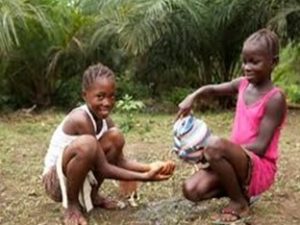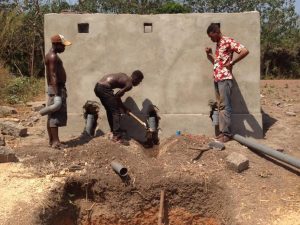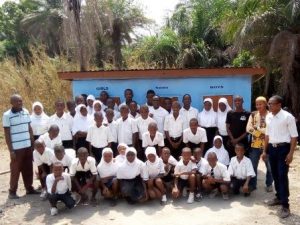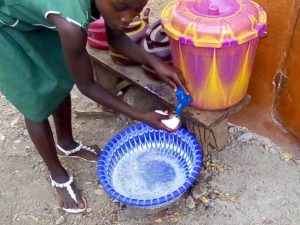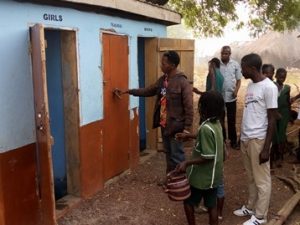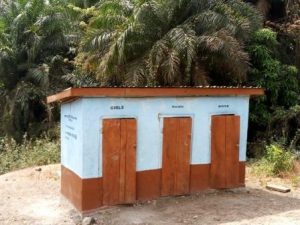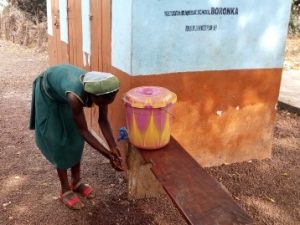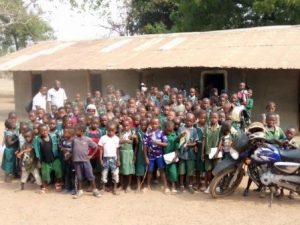Outline of the Follow-up observations
Our priority is placed on responding to the issues and needs of the field in an efficient and effective way.
Since 2015, we have been carrying out follow-up observations one year after the completion of projects in order to understand changing issues and needs.
In FY 2019, the fifth year since we started our follow-up observations, we asked five grass-roots organizations in the Lao PDR, Malawi, Sierra Leone, and Uganda (2 projects) that had been granted the JWF Fund 2018 to conduct follow-up observations. We received consent from the organizations in all the locations except the Lao PDR. With this cooperation, we have been able to conduct our one-year follow-up observations.
This page describes the project Good Sanitation Facility is Life (Construction of 2 Pit Latrines and Good hygiene practice education in 2 Schools) in Sierra Leone.
Good Sanitation Facility is Life (Construction of 2 Pit Latrines and Good hygiene practice education in 2 Schools)
|
Outlines of the project supported by the JWF Fund 2018 Background:
Main activities: * VIP (Ventilated Improved Pit) toilet is a sanitary facility equipped with ventilation pipes to prevent odors and flies from occurring.
|
Follow-up observation in 2020
Results of the survey conducted Mr. Michael Luseni of the EEHRSL are as follows:
- Current situations of the VIP Latrines and hand washing facilities
– Two VIP Latrines and hand washing facilities are functioning. Education and awareness training sessions conducted in 2018 in school help students use the facilities properly.
– There has not been any major damage to the building or the hand washing facilities. The only damage found was to the two padlocks on the doors, but they have been fixed.
- Operation and maintenance system
– The School Authorities and the School Management Committee (SMC) agreed to perform various responsibilities to ensure that the VIP Latrines and hand washing facilities are maintained and function well.
The School Authorities agreed that:
・The School commits to make a small quarterly financial contribution from the government subsides in order to ensure that the VIP Latrines and hand washing facilities function well.
・The teachers commit to contributing financially every month and to monitoring the use of the VIP Latrines and hand washing facilities in order to ensure that they function well.
・The teachers commit to contribute $2.00 (SLL20.000) monthly to maintain the VIP latrines and the hand wash facilities. While the school contributes on a quarterly biases of $25.00 (SLL250.000) from its government subsidies to maintain the latrines. All major maintenance and repairs are the responsibility of the SMC.
School Management Committee (SMC) agreed that:
・The SMC commits itself to carrying out any major or minor repairs to the VIP Latrines and the hand wash facilities, so as to ensure that the VIP Latrines and hand washing facilities continue to function well.
・The SMC will to do on-the-spot monitoring every three weeks and give feedback to the school’ head teacher and the SMC chairperson on possible action if needed.
– The school authorities and the SMC take care of the facilities.
There is a system put in place by school authorities whereby the latrines are cleaned by the students. They maintain a roster of students to clean on a daily basis, supervised by a teacher. This is encouraging because the schools have no provision to hire the services of a cleaner.
- Changes among the beneficiaries
– The following changes have been found:
・Abandonment of open defecation
・Good hygiene practices in school and at home
・Adaptation of hand washing with soap after using the latrine and after dirty work
・Improved environmental hygiene practices at both schools
・Increased hygiene education and awareness that reduce diarrhea related illnesses and lower the infant mortality rate
・Better hygiene behavior that helps save lives
– Water-borne diseases have been reduced through ending defecation in the bush and behind their schools and through good hygiene education.
– Practices sessions have greatly helped community people reduce water-borne diseases in their communities.
– Community people have started digging local pit latrines, though with unhygienic fence of palm thatch.
Voices from the beneficiaries
|
|
|
|
Mr. Foday S. Kamara, 15 years old, a pupil
|
|
|
|
| VIP Latrine constructed in 2018 at the school in the Boronka Village |
VIP Latrine constructed in 2018 at the school in the Rogbonkoh Village |
|
|
|
| Hand washing Facility in the school of the Boronka Village | Students in the school of the Boronka Village |
(Reported by Shigenori Asai, Director)
